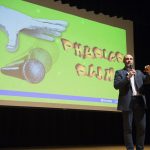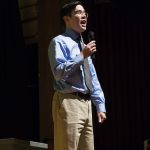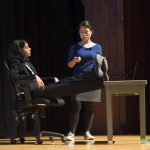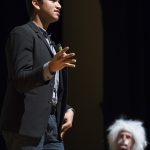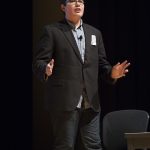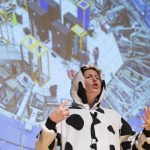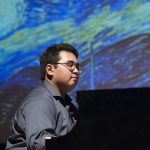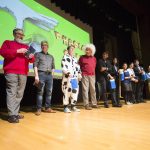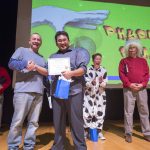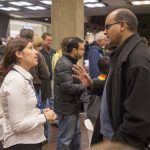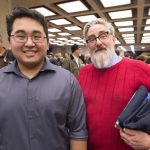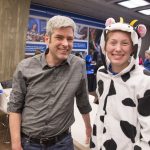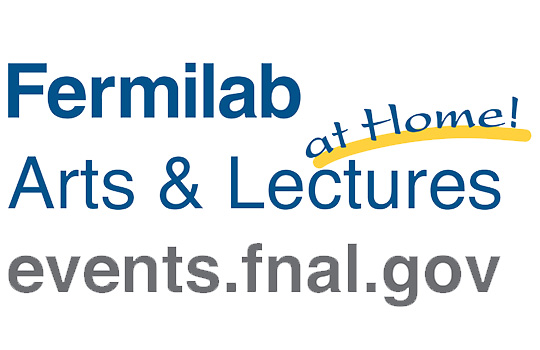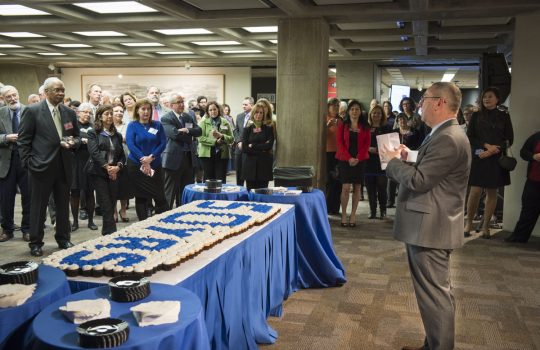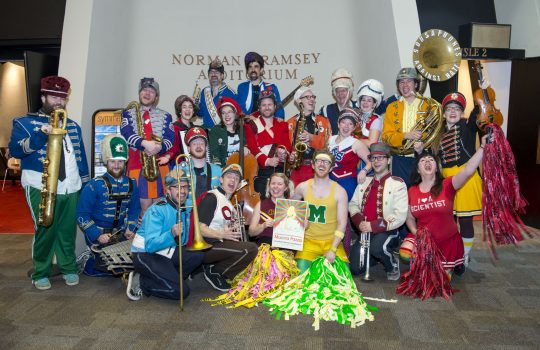On Friday, for the sixth year in a row, Fermilab sold out Ramsey Auditorium for its Physics Slam, one of the most popular events in its annual Arts and Lecture Series lineup. But this year, much to the audience’s delight, there was a new twist.
The Physics Slam usually pits five scientists against one another in a no-holds-barred competition to make particle physics research accessible and entertaining. This year, in honor of both Fermilab’s 50th anniversary and the Illinois Math and Science Academy’s 30th anniversary, the organizers paired Fermilab scientists with IMSA seniors and let them loose. It’s a fitting combination, since Fermilab’s second director, Leon Lederman, helped to found IMSA in 1987, and the two institutions have maintained a close relationship since.
The result was a show that had audience members loudly cheering and, by the end, wiping away tears. Over months of collaboration, the five teams concocted five very different presentations on five diverse areas of physics and brought them together into a funny, moving evening.
The rules remained the same this year. Each team was given 10 minutes, rigidly timed, to present on their chosen topic. They were allowed to present in any way they chose, using props, audience participation, music, etc. The winner of the Physics Slam is determined by audience applause, aided by a decibel meter, and receives a prize from Fermilab Director Nigel Lockyer.
As in previous years, the event was emceed by Chris Miller, a professor of speech at the College of DuPage. But this year, the introductions of the speakers fell to Peter Dong, a physics professor at IMSA who also leads a research project with IMSA students at Fermilab. His personal connection with the students led to many warm-hearted laughs as he told stories of their time in his classes. Dong and Cathe Stieg, community and alumni relations manager at IMSA, chose the five students who competed.
IMSA student Gunwati Agrawal and Fermilab engineering physicist Cindy Joe kicked off the night with a two-person play about the recent detection of gravitational waves with a visible source. At one point the pair asked the audience to stand in for the galaxies in the night sky to demonstrate how difficult it is to pinpoint one astronomical event in the cosmos, and how effectively the LIGO and Virgo collaborations, with the help of the astronomy community, did so.
Fermilab scientist Don Lincoln worked with student Abhiudaya Bhalla on a talk about quantum computing and cryptography, but could not attend Friday’s slam. In his place, Fermilab scientist Bill Freeman dressed as Albert Einstein and offered cantankerous commentary on Bhalla’s presentation. (“Don’t get me started on Schrodinger,” he growled at one point. “That guy had like fifty cats!”) By the end, Bhalla had made the case for quantum computers as the next wave of cybersecurity.
Student Isabella Ginnett teamed with theorist Dan Hooper to sing the praises of the muon, the electron’s heavier cousin. Well, not exactly sing, but she did rap their praises, performing a parody of DJ Jazzy Jeff and the Fresh Prince’s hit “Parents Just Don’t Understand” while dressed in a cow costume. “I’m a mooo-on,” she said to a roar of appreciative laughter from the audience, and her rap touched on the many uses of muons, both in and out of the realm of particle physics.
Neutrino scientist Minerba Betancourt was matched with student Manny Favela for a presentation they called “Neutrinos: Nature’s Transformers.” In a rapid-fire 10 minutes, the team covered the relative size of particles (with fruit as props), the different types of neutrinos, their tendency to oscillate (or transform), the experiments currently operating at Fermilab to study those ghostly particles, and the future of the field.
But it was student Rain Bravo and scientist Chris Stoughton who won the day. Taking the stage alone, Bravo delivered a thoughtful meditation on astronomy and its ability to connect us. The human mind can know the truth about the universe, Bravo said, but it is the human heart that can turn that truth into beauty. And then to demonstrate, he played a Chopin nocturne on the auditorium’s grand piano as images of van Gogh’s Starry Night faded into darkness behind him.
It was a moving conclusion, and it brought the house down. Lockyer presented Bravo and Stoughton with a gift from Fermilab and each presenter with a certificate, and his congratulations. (The slam was performed in full the prior night for the IMSA community, where Ginnett and Hooper won.)
After the show, the five students were surrounded by appreciative audience members shaking their hands and taking photos with them. For those wondering if this new spin on the Physics Slam would work, and would be a positive experience for the students involved, their beaming faces told the whole story.

